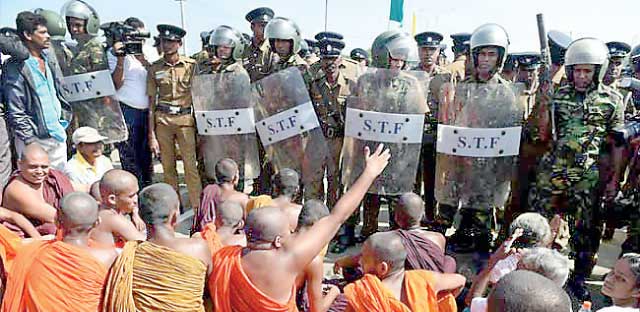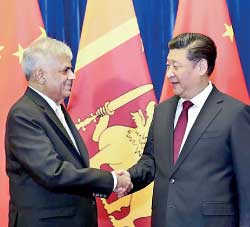Reply To:
Name - Reply Comment
Last Updated : 2024-04-26 02:12:00

“Freedom has cost too much blood and agony to be relinquished at the cheap price of rhetoric.” ~Thomas Sowell
 Sri Lanka is surrounded by the Indian Ocean. Yet, the physical presence of India up north has had an intimidating influence on most of Sri Lankans. While its admirers, especially those Indophiles, who have made it a point to be more conversed in India’s history, culture, cuisine and her people than their own history and people, have chosen to subordinate their love for the country to an intellectual odyssey.
Sri Lanka is surrounded by the Indian Ocean. Yet, the physical presence of India up north has had an intimidating influence on most of Sri Lankans. While its admirers, especially those Indophiles, who have made it a point to be more conversed in India’s history, culture, cuisine and her people than their own history and people, have chosen to subordinate their love for the country to an intellectual odyssey.
These intellectuals have voyaged on that odyssey and the majority whose misplaced patriotism has overwhelmed their common sense and compassion for their equals in the north of their own land opted to be more aggressive in safeguarding their rights and privileges even more violently at times.
That parochial thinking has caused irreversible polarisation in the country and that polarisation is being exploited by the last regime of the Rajapaksas and continues to be so to date.
That is the context within which I propose to present the following.
Chinese involvement in our country’s economy and its unmistakable influence on the continuation of massive development programmes financed and undertaken by its own companies are featured most prominently within this context.
According to official reports: “On Saturday, December 9, 2017, the Government of Sri Lanka completed the formal handover of the strategic port of Hambantota to China, which will take control of the facility on a 99-year lease.”
There are no uncertainties whatsoever about China’s profound involvement in the development and being a stakeholder of the totality of the project.
However, our immediate neighbour India could advance many a speculative theory. A takeover of Sri Lanka as a Chinese satellite country, exploitation of Sri Lanka’s resources for the benefit of an expanding Chinese financial empire are some of these theories India seems to be subtly floating around the nations that are geopolitically engaged with Sri Lanka’s politics and economy.
Yet, India’s credibility has been damaged. At least inside Sri Lanka, especially in the context of the 30-year war against the Liberation Tigers of Tamil Elam (LTTE), Chennai’s sympathy with the LTTE and their flirtations with the militant Tamil groups who did not believe in a Unitary State of Sri Lanka, so far as to drive our Sinhalese Buddhists to the brink.
China, while watching this gaping gulf between the two communities in Sri Lanka developing into a geopolitical canyon between the two countries, India and Sri Lanka, played her geopolitical cards with utmost craft and they trumped all her rivals, mainly India.
The allegiance of Tamil militants to Tamil Nadu, first with M. G. Ramachandran and then with Jayalalithaa of Chennai challenged the spine of Sinhalese Buddhist majority in Sri Lanka. A military conflict between the respective armies became a war between two peoples- Sinhalese against Tamils.
This simple political dynamic was not understood by the Federal Government of India at the power centre in Delhi.
China, while watching this gaping gulf between the two communities in Sri Lanka developing into a geopolitical canyon between the two countries, India and Sri Lanka, played her geopolitical cards with utmost craft and they trumped all her rivals, mainly India.
China’s proactive approach to assist Sri Lanka’s flailing economy during the Rajapaksa’s regime paid dividends.
With scarce attention to local politics, she chose to cultivate the financial hub of the country, befriending the bigwigs who matter, not necessarily in politics but in economics, China’s inroads into Sri Lanka’s economy literally went through the highways in the country.
With the financing of the Colombo Port City project, its superlative presence and being the main instrument in reshaping the Colombo skyline that has mesmerised many an observer, China’s profound engagement in Sri Lanka’s economy has taken root.
Into this friendly geopolitical scenario entered the renewing of the Hambantota Port City development project.
This project was initiated by the Rajapaksas with no pre-feasibility studies conducted by any credible engineering sources, was languishing in the backyards of Hambantota. Sri Lanka’s new Prime Minister, after a serious misstep during the Presidential Election campaign in 2015, wasted no time in rejuvenating this dying giant of a project.
Mahinda Rajapaksa’s statement in China negates the much assumed ‘purity of purpose’. Sri Lankans may well be convinced that Chinese are here for good reason; good for China and better for Sri Lanka.
Ranil Wickremesinghe, while campaigning as the leader of the Opposition against the then President Mahinda Rajapaksa, stated publicly on the election platform that he would close the Colombo Port City Project in the event of victory. He knew that he made a serious gaffe.
Terribly upset by this statement, the senior staff of the Chinese construction company directed an immediate and abrupt halt to the ongoing work on the Colombo Port City site. It took more than twelve months for the work of the Colombo Port City to recommence.
Subsequent to this turnaround of events, after new Parliament was elected and a new Government led by the United National Party (UNP) was in place, new Prime Minister Ranil Wickremesinghe could not abide by his election-statement.
 All realities on the financial and economic platform suggested that the work of the Colombo Port City had to go on. On the geopolitical sphere, it was even more attractive and urgent for Sri Lanka that a geopolitical reality of a friendly China is infinitely more advantageous for Sri Lanka than as an unfriendly Superpower.
All realities on the financial and economic platform suggested that the work of the Colombo Port City had to go on. On the geopolitical sphere, it was even more attractive and urgent for Sri Lanka that a geopolitical reality of a friendly China is infinitely more advantageous for Sri Lanka than as an unfriendly Superpower.
The same mindset prevailed for the country’s economic growth’s sake and Sri Lankan Prime Minister Ranil Wickremesinghe attended a special event in December last year, 2017 to mark the handing over, formally described as a Concession Agreement, in the Port City of Hambantota.
Hambantota International Port Group (HIPG) and Hambantota International Port Services (HIPS), two new companies set up by the China Merchants Port Holdings Company and the Sri Lanka Ports Authority, will collectively own the Hambantota Port.
That ceremony marked the beginning of operations in Hambantota Port. Earlier in July 2017, China Merchants Port Holdings Company agreed to pay $1.12 billion for an 85 percent share in Hambantota port on a 99-year lease.
In the backdrop of the country’s dire financial needs, China’s open and aggressive engagement comes as a welcome relief for the recipient country, Sri Lanka. But what is intriguing is what the former President Mahinda Rajapaksa did just in the wake of signing the agreements between China and Sri Lanka.
It was reported that during a visit to China, Sri Lanka’s former President Mahinda Rajapaksa warned that there could be mass public unrest in Sri Lanka if China were to carry out its plan to take over the Hambantota deep-sea port and create a nearby 15,000-acre special economic zone.
While the former President had not been hesitant to publicly hurl political vituperation against his country’s current administration, he seemed to have been dead accurate.
Earlier, the same day he made this statement, as the ceremonial first brick of what was christened as the ‘Southern Industrial Zone’ was laid in Hambantota; the place erupted in violent protests.
The violence left more than ten people hospitalised and many incarcerated. Security personnel and Buddhist monks clashed in Hambantota on January 7, 2017. Sri Lankan nationalists, monks and local residents protested against the creation of an Industrial Zone for Chinese investments.
Mahinda Rajapaksa’s statement in China negates the much assumed ‘purity of purpose’. Sri Lankans may well be convinced that Chinese are here for good reason; good for China and better for Sri Lanka.
In the current environment of a cash-crunch, Sri Lanka’s positioning in the marketplace has got weaker. Its negotiating ability has been weakened and if there is one person who has understood the brutal reality of this positioning is the Prime Minister.
With all his political shortcomings, which have been his Achilles Heel, his reading on the economy has been proven right over and over again. A solid foundation laid down by his party’s ideological tilt and a practice of voracious reading has helped him in that.
Since the opening of the economy in 1977, Sri Lanka’s economy has been journeying only towards one end-goal: the capitalist economy.
By the dawn of the seventh decade of the Twentieth Century, the Mecca of Socialist Economy, the Soviet Union was trembling with its own inner economic problems. With over-spending on their military, in order to stand equal with the American military might, the Soviet Union’s continuing policy of starving the population at the altar of military might not withstand any more threats from the crumbling of its satellite nations.
Poland began her trek to freedom from the Soviet Czar of Socialist economic strangulation. With the fall of Poland, the rest of the Eastern European socialist bloc began its collapse like a pack cards. What was introduced as the salvation of the proletariat in the early 20th Century would not last one hundred years.
On Saturday, December 9, 2017, the Government of Sri Lanka completed the formal handover of the strategic port of Hambantota to China, which will take control of the facility on a 99-year lease
The other Communist power China began her own adoption of free-market economic policies with Deng Xiaoping. According to Ezra Vogel, a scholar of contemporary East Asian history and culture, ‘no one in the twentieth century had a greater long-term impact on world history than Deng Xiaoping. Once described by Mao Zedong as a “needle inside a ball of cotton,” Deng was the pragmatic yet disciplined driving force behind China’s radical transformation in the late twentieth century. He confronted the damage wrought by the Cultural Revolution, dissolved Mao’s cult of personality, and loosened the economic and social policies that had stunted China’s growth’.
That is the China we are dealing with today.
The writer can be contacted at vishwamithra1984@gmail.com.
ReXXaR Wednesday, 07 March 2018 10:05 AM
I am sorry..Am I missing something here??Is the writer really appreciating SL's huge debts to China and losing part of the nation's land to the Chinese???
Nith96 Wednesday, 07 March 2018 04:24 PM
Yes indebting a country to an extent of default and then taking over the ports is a great sign of friendship and Goodwill.
Hitesh Thursday, 08 March 2018 10:27 AM
hahaha the author is either drunk or a Chinese ! how can you appreciate colonialization by China ? Can modern countries be stupid enough not to understand China's motives ? Your hate for India can be justified but this false sense of friendship with China is utter BS.

Add comment
Comments will be edited (grammar, spelling and slang) and authorized at the discretion of Daily Mirror online. The website also has the right not to publish selected comments.
Reply To:
Name - Reply Comment
US authorities are currently reviewing the manifest of every cargo aboard MV
On March 26, a couple arriving from Thailand was arrested with 88 live animal
According to villagers from Naula-Moragolla out of 105 families 80 can afford
Is the situation in Sri Lanka so grim that locals harbour hope that they coul